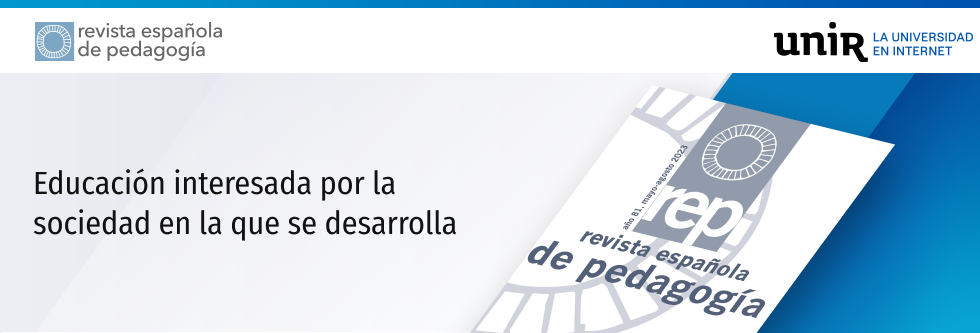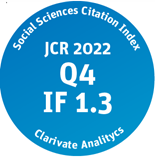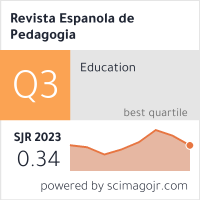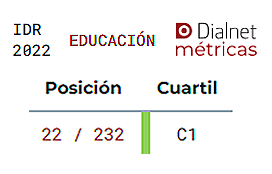Vol. LXXV (2017) - No. 268 Teorizando en Educación: entre erudición, poesía y opinionitis [Theorising in education: Between erudition, poetry, and opinionitis].
Resumen
When reading a book, we usually start from the first page and patiently continue along the path the author has marked out for us without any problems. There are cases, like when the text is a collection of independent chapters, where it does not matter where one starts, but there are other cases where the author plays with the reader and suggests an order that almost obscures, or at least hides, the ultimate meaning of the text. This might be one of these cases, as this text by Prats seems to make sense thanks to its third chapter, with the whole text being a di- alogue and response to what is raised in this third chapter of the four that make up this work. I will not follow the order of the book. Instead I will start with chapter three, then move on to chapter one and finish with the one I believe is the best of all of the chapters, number two. ,
We live in times when pedagogical thinking is out of fashion, indeed it even seems that it is a target to attack in any gathering or opinion article. Of course, many people do not regard it as an area of knowledge that has attained the status of science, and it is a realm where opinions can exist in comfort as they do not have to confront a scientific body of knowledge. There are numerous texts that set out to attack the work of pedagogy as though it was pure ideology, unable to produce science with all knowledge at the same level, thus making it impossible to establish an objective hierarchy of value. This is the core problem that the author tries to analyse in chapter three of this book. ,
With practical activities, and education is one of them, there are always problems when combining theory and practice. Many students, for example, claim that universities fail to provide practical training while providing excessive theory, forgetting that all practice contains theory and that there are two types of person regarding this matter: those who know that theory guides their practice and those who do not realise that it guides their practice. This book sets out the idea that theories can be explicit or implicit and that anyone who teaches, at any of the levels at which we work, must survive using a mix of the two. As the author acknowledges, everyone who is now a teacher has been a stu- dent, and we have unconsciously acquired pedagogical beliefs that are obscured even to ourselves. ,
The belief that we can teach without an educational theory provokes a certain disdain for this world that does not explain what we should do and can even confuse us. According to the people who believe this, it is possible to teach without pedagogical theory as teaching practice and knowledge of the subject would on their own suffice. ,
But this is not true; as is stated above, theories always exist, it is just that they are not always made explicit. It is precisely this character as a source of im- plicit ideas about education that Enric recognises in current antipedagogical literature: «it is not a matter of making these books anathema, but of knowing how to extract some of their main arguments and observe how in Pedagogy, in upper case here, for several decades now, we have been trying to break away from simple discourses that reduce reality to hard to digest categories» (p. 147). In- deed, reading these texts can allow us to rediscover or confront the practical problems with which the teaching profession grapples, now based on a systematic theory rather than opinionitis. However, these antipedagogy books also inadvertently show the reality of a knowledge which is not that of disciplines but that of their teaching, concepts that, as we have always known in pedagogy, are different. Nonetheless, this is not their only value. ,
However, to uncover this extra value, a more precise and rigorous dissection of the entrails of these antipedagogy handbooks would have been desirable, thus showing that they are not just of value because they make explicit what is implicit, but also because there are ones of different levels and because some of them can be right in some diagnoses. The general treatment of them in the text prevents us from sorting the wheat – and wheat there is – from the chaff, which is also abundant. To use philosophical terminology, current antipedagogical literature contains not just doxa but also endoxa. It is true that many of these books are reactive, they have an air of trench warfare and are written «from the trenches», and this origin greatly limits their possibilities and their value, but we should not be unwilling to recognise the valuable, and in some cases even brilliant, reflections contained in them. ,
Prats places two chapters ahead of chapter three. The first reviews the traditional paradigms used as the basis for theorising about education. This is an interesting chapter for anyone who wants to find out about the principal schools of educational theory, seen, above all, through the eyes of Catalan theorists, but it is of less interest for experts in the field. This chapter would have benefited from coming after chapter three, which is dedicated to sensationalist pedagogies, implicit pedagogical ideas and opinionitis, as it would have obliged the author to write it differently, making him update the interesting aspects of the theory of education. ,
The last chapter we will discuss is chapter two, called «The poetic view: When fiction theorises on education». This is, in our opinion, the most interesting part of the book, for several reasons. First because it establishes a relationship between fiction and theory that, while not being new, is still fruitful. Fiction, when it is good, allows us to draw attention to the complexity of educational phenomena and has great possibilities for theoretical analysis. Prats analyses three works in this chapter and does so armed with a fourth one that acts as an interpretative key that makes it possible to extract pedagogical knowledge from works that are not strictly about pedagogy. The three works he uses are: The professor by Charlotte Brontë (1857), I married a communist by Philip Roth (1998), and Wilt by Tom Sharpe (1976), and the interpretative key is the autobiographic work Chagrin d’école (2007) by Daniel Pennac. ,
On the author’s journey through the pages of the fine selection of books used in this chapter, we form our view of the classical problems of the educational relationship, school bureaucracy, the role of academic disciplines, the idealism of the teacher, the hypercomplex reality of classrooms, pupils and students, adolescence, authority, and many other classic themes from theoretical reflection on education. ,
This book concludes with a fourth chapter that is more of an epilogue that argues for the need for educational theory, as «without education there is no humanisation» (p. 168). ,
David Reyero ■
Citación recomendada | Recommended citation
Reyero, D. (2023) . Vol. LXXV (2017) - No. 268 Teorizando en Educación: entre erudición, poesía y opinionitis [Theorising in education: Between erudition, poetry, and opinionitis].. Revista Española de Pedagogía(1). https://www.revistadepedagogia.org/rep/vol0/iss1/68
Licencia Creative Commons | Creative Commons License
Esta obra está bajo una licencia internacional Creative Commons Atribución-NoComercial 4.0.
This work is licensed under a Creative Commons Attribution-NonCommercial 4.0 International License







Commentarios | Comments
Prats, E. (2015).